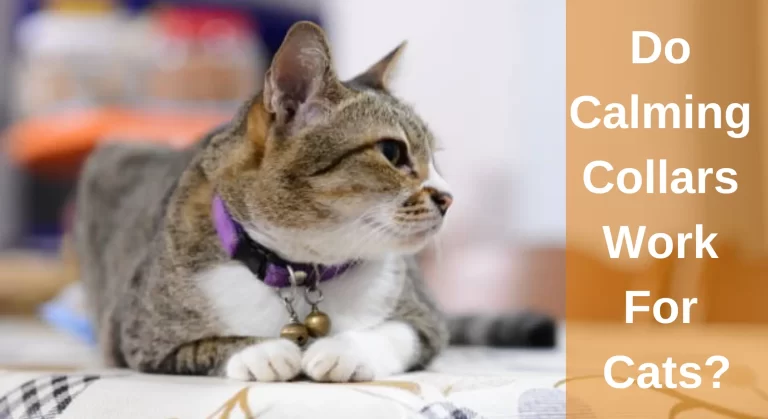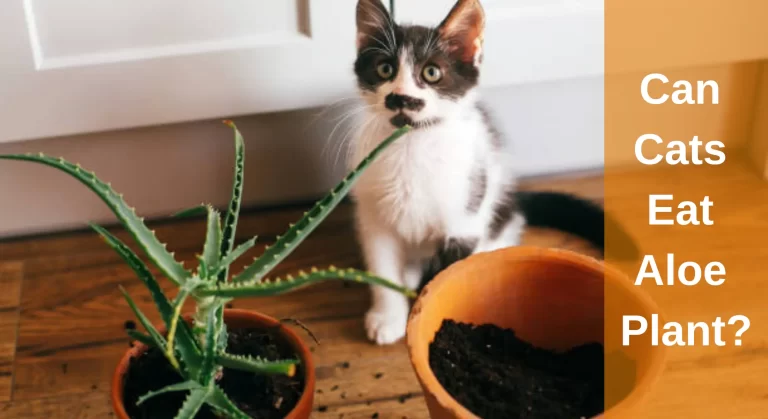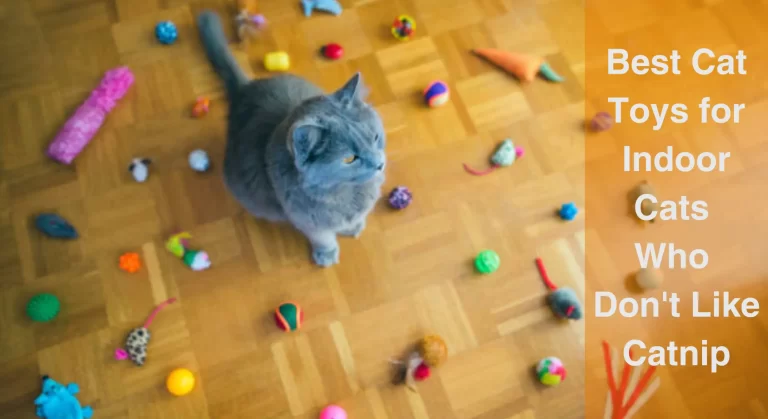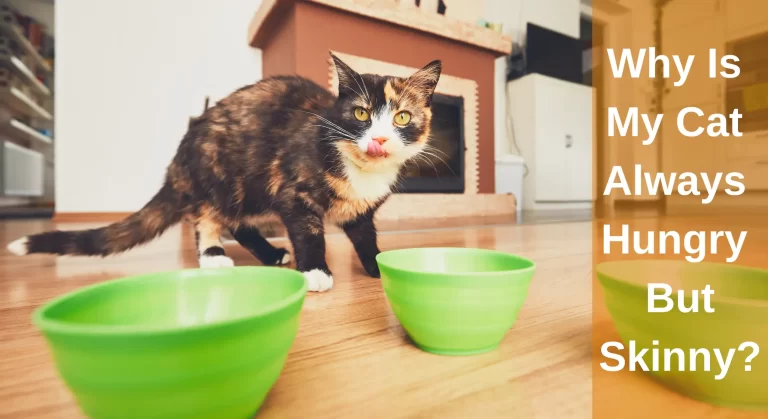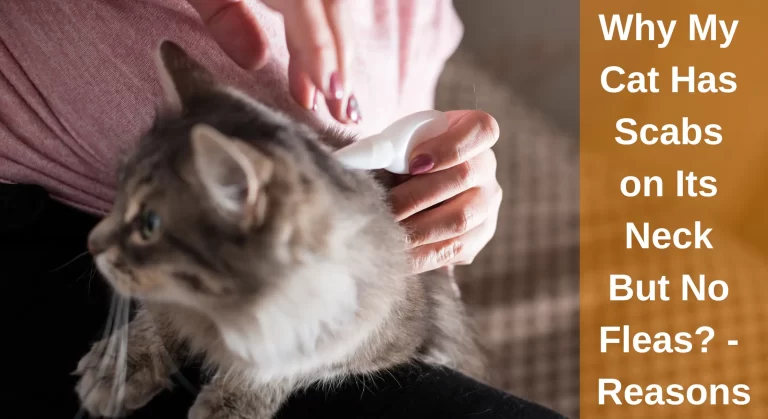Can Cats Eat Spider Plants? Are Spider Plants Toxic to Cats?
Cats are curious creatures and are known to explore their surroundings. As a cat owner, it is your responsibility to ensure that your cat is not eating anything harmful to them. Spider plants are a popular houseplant that can be found in many homes. However, many cat owners are concerned about whether or not spider plants are safe for their pets to eat. Can cats eat spider plants?
According to the Animal Welfare Society of America (ASPCA), spider plants are not toxic to cats. However, the REAL reason cats enjoy this plant is that it contains chemical elements linked to opium that have a mild hallucinogenic effect on cats. Like catnip, the spider plant produces substances that pique your cat’s curiosity and lead to obsessive behavior.
This article explains more about how your cat loves spider plants, how spider plants can be toxic, how you can prevent your cat from getting poisoned by houseplants, and what to do if your cat does get poisoned.
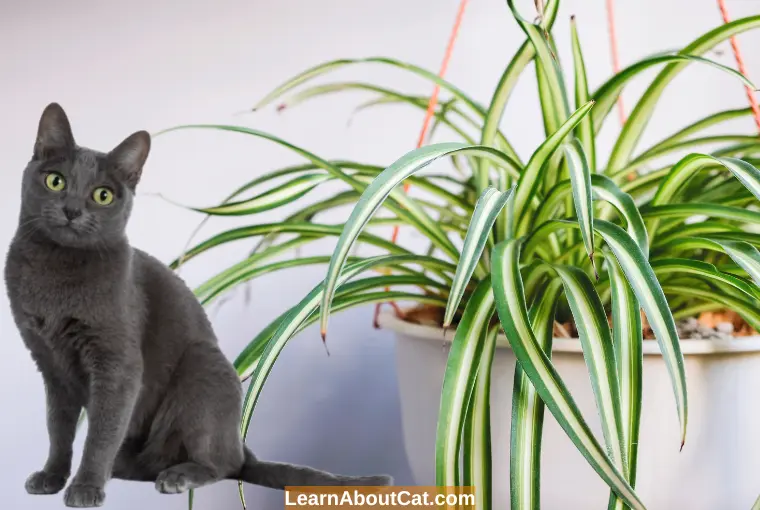
What are spider plants?
Spider plants, also known as Chlorophytum comosum, spider ivy, and ribbon plant, are popular houseplants known for their long, green leaves that dangle from a central stem. They are easy to care for and are often used as decorative plants in homes and offices.
It thrives well in a hanging basket and generally has long (up to 18 inches long!) leaves that dangle outside the flowerpot.
This plant doesn’t smell strong, so cats wouldn’t be drawn to it. This plant’s grassy leaves are intriguing to look at and, if you’re a cat, a fantastic spot to hide, which may be why cats enjoy it. Cats could find the spider plant entertaining.
Check Out: Can Cats Eat Sage?
Are Spider Plants Safe for Cats?
Yes, According to the ASPCA and other educational websites, cats are not harmed by spider plants. However, because cats are drawn to spider plants for their chemical components, consuming the leaves might cause digestive issues.
Even though they are considered “safe” for cats, excessive consumption of spider plants may cause intestinal issues, thus, you may need to move your spider plant out of your cat’s reach.
Find Out: Are Snake Plants Toxic to Cats?
Are Spider Plants Toxic to Cats?
You’ve probably heard of spider plants’ alleged ability to induce hallucinations. Some sites claim that there is evidence that this plant does provide a modest psychedelic experience in cats. It is believed that these effects are secure, though.
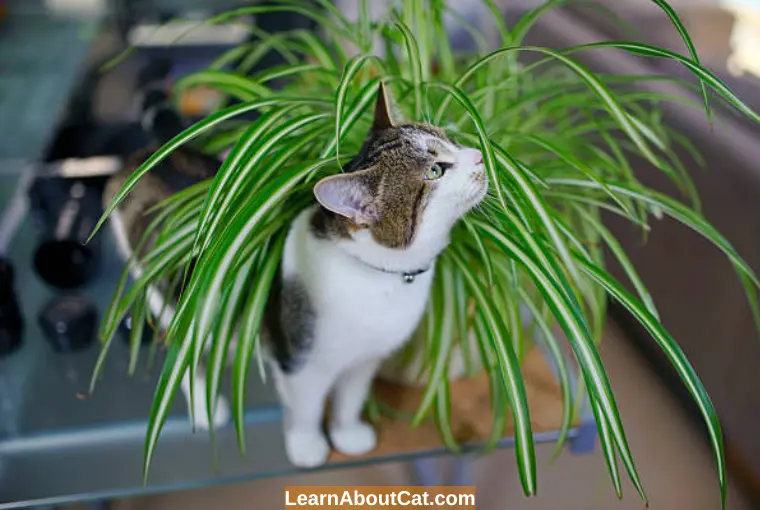
Spider plant is classified as non-toxic to cats and other pets. According to ASPCA (American Society for the Prevention of Cruelty to Animals), National Capital Poison Center, and several other educational websites.
This means that if your cat ingests a spider plant, they are unlikely to experience any serious health problems. However, it is important to note that some cats may still experience mild gastrointestinal upset if they eat spider plants.
Some of the compounds found in spider plants are thought to be connected to opium. Even though these drugs are not harmful, they may cause nausea, vomiting, and diarrhea.
Due to this, it is advisable that you keep cats away from the plants even if spider plant toxicity only causes minor adverse effects.
Like people, each cat is unique, so what affects one cat slightly can have an entirely different effect on another. Spider plants are harmless for cats, although, as was already said, they could cause your cat to trip.
Also, Check Out: Is Christmas Cactus Toxic to Cats?
Why Do Cats Like Spider Plants So Much?
You may have noticed that your cat likes your spider plant over the other piece of greenery on the show if you have a lot of houseplants. This can be problematic since, as was mentioned earlier, consuming large doses of Chlorophytum comosum might cause stomach trouble even if it is not dangerous.
But why do cats seem to like spider plants so much? There are several theories to account for this.
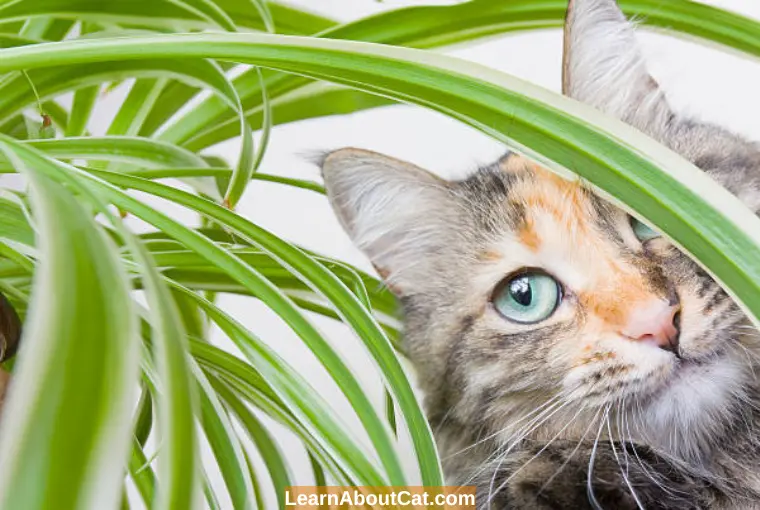
1. Looks Like Grass Blades
The most well-known feature of the plant is its leaves, which resemble long, thick blades of grass. In the wild, cats eat grass to help with digestion.
Wider blades are believed to provide a mild laxative effect, whereas thin blades are known to soothe an upset stomach. Therefore, it seems sensible that your cat would eat your spider plant for the same digestive benefits.
2. Releases Opimum-like Compounds
comparable to opium. The opium-like chemical that spider plants are known to emit makes them slightly hallucinogenic for cats. Cats will have a little psychedelic effect that is entirely harmless, but it will give them the desired euphoric high from catnip.
This explains why they frequently pick this plant over others. You should watch out for your cat’s excessive excitement and jitteriness, as these hallucinogenic chemicals also create the same feelings in them.
3. Considered a Toy (Entertaining pastime)
Small at first, spider plants grow into big plants with several long, dangling stems and leaves and new offspring that branch out.
You are probably already aware that cats seem to like playing with anything that hangs in the air, so it stands to reason that they could find it.
Like hunting for their prey in the wild, cats play with toys. They will spy on toys, batter, bats, gnaw, and lick them. This may assist in explaining why your cat chews on the spider plant’s leaves while it plays if it is boring and needs more excitement.
Intresting Reading: Are Zinnias Toxic To Cats?
What Happens if a Cat Eats a Spider Plant?
The ASPCA states that eating spider plants is okay for dogs and cats. Conversely, cats are drawn to the Spider Plant because of its mild psychedelic properties.
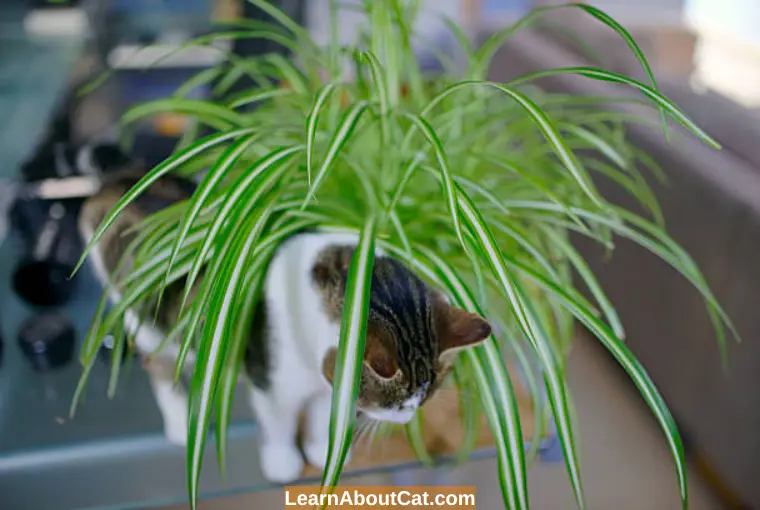
Cats are more likely to play with the plant, which raises the likelihood that they may consume it and get stomach distress, vomiting, or diarrhea.
They won’t harm your cat, but spider plants generate compounds that entice cats, much like catnip. Catnip cannot hurt cats; however, the spider plant may (We advise against having spider plants at home).
The spider plant has certain psychedelic qualities. Though mild, remember that they will only cause your cat to act erratically or jumpy. Although these plants are not harmful, if your cat eats too much of them, it might have problems.
You should try to keep your cat away from particular plants. The substances linked to opium may give your cat stomach pains, vomiting, and diarrhea.
How Can I Prevent My Cat from Eating Spider Plants?
Even while spider plants do not pose a severe health risk to cats and are neither toxic nor hazardous to them, keeping them out of your feline friend’s reach is still recommended.
Cats love spider plants so much that overindulging might make them feel ill. You might be surprised to learn how regularly this can happen.
These recommendations can help you protect your cat’s general health and wellness by keeping them away from your spider plant and also prevent your cat from killing your spider plants:
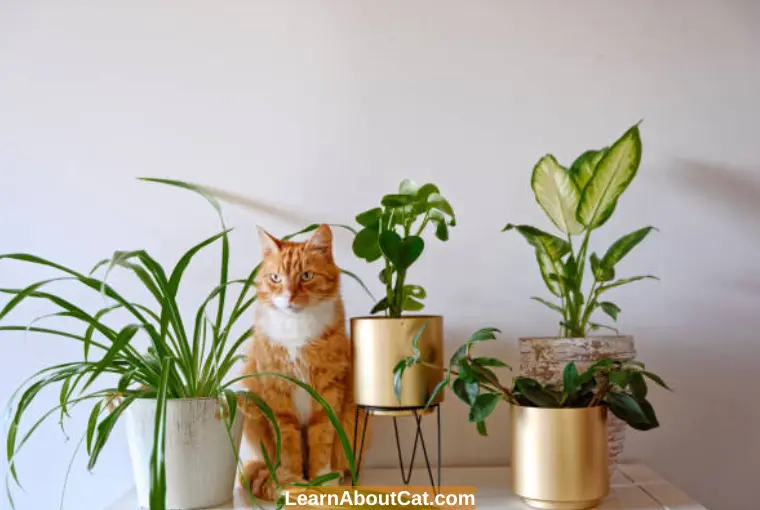
Guidelines for Keeping Your Cat Safe From Spider Plants
1. Keep them in Hanging Baskets
Keeping your spider plant out of reach is the easiest way to prevent your cat from eating it, but this may be easier said than done. To do this, one strategy is to keep the plant in an area that your cat cannot get.
There is nowhere a cat can’t get to with a little persistence since cats enjoy climbing. It would be less beneficial to place it on a ledge so they don’t frequently ascend.
If your cat enjoys eating plants, there are several things you can do to stop them from eating spider plants. Because spider plants are commonly found in hanging baskets, position them high and away from your cats.
They must be kept from items since cats prefer to climb over furniture and windowsills.
2. Repel Them With Spray
If you don’t have a suitable spot out of reach to hang your plant, you might want to consider sprinkling its leaves with a bitter-tasting repellant. It’s not ideal, but it could be helpful because cats avoid plants that taste terrible.
You may use the strong sense of smell that cats have to steer clear of particular areas of the house or objects like your spider plant. Their enhanced sense of smell may make strong and intense odors quite overwhelming and disturbing.
Cats don’t like the smells of citrus, coffee, lavender, chili, mustard, mint, or rosemary, to name a few.
3. Keep them in a Separate Room
Keeping your spider plants out of reach of your cat companion is frequently a wise choice. For example, many people keep houseplants in their bathrooms to take advantage of the humidity.
4. Use Cat Deterrents
You may also use physical deterrents or spray deterrents to prevent your cat from eating your spider plant.
Physical deterrents can be things like spiky mats or sticky tape. These may be placed where the plant container would typically be. They won’t damage your cat when they step on it, but it won’t feel pleasant on their paws. This could be enough to convince your cat to stay away.
Spray deterrents are exactly what they sound like—liquids you apply to the plant or the vicinity of it to fend off cats. Cats are notorious for abhorring vinegar, a popular DIY remedy.
5. Grow Plants For Your Cat
Consider cultivating certain plants for your cat. While certain indoor plants are toxic to cats, others are specifically designed to be cat-friendly.
You can cultivate cat grass and catnip plants from seeds at home, and your cat may pick from several cat grass and catnip varieties that are easily found on the market.
These attractive plants attract your cat’s interest, which deters them from damaging your prized spider plants.
6. Keep Your Cat Busy(Entertained)
Make sure your cat has enough stimulation. Boredom is one factor that might cause your cat to harm your beloved houseplant. To assist your cat in burning off surplus energy, make playing with it a regular part of your day.
Because a weary cat is less likely to make an effort to entertain itself, fewer plants will be destroyed, and you won’t have to cry as much.
Giving your cat as many different items as you can is excellent. Toys like feather wands, toy mice, and cat-kicking toys are excellent investments if you want to play with your cat and strengthen your bond with her. If you have one, try to play with your lively kitten for at least 15 minutes every day.
7. Pruning the Plants
If your spider plants’ foliage has grown to the point that the cat can get the spiderettes, you might need to cut it back or divide it.
Keeping your spider plant pruned is another way to prevent your cats from devouring it. Cats usually like playing with the many leaves that dangle from spider plants. Regular pruning will be advantageous to both your plant and your cat. It can support the plant’s renewal and keep the look of health overall.
How to Tell If Your Cat Ate Your Spider Plant?-Sings
Despite your best attempts, your cat could succeed in biting into one of your spider plants. Since it seems inconceivable that spider plants might be harmful, this is hardly the end of the world.
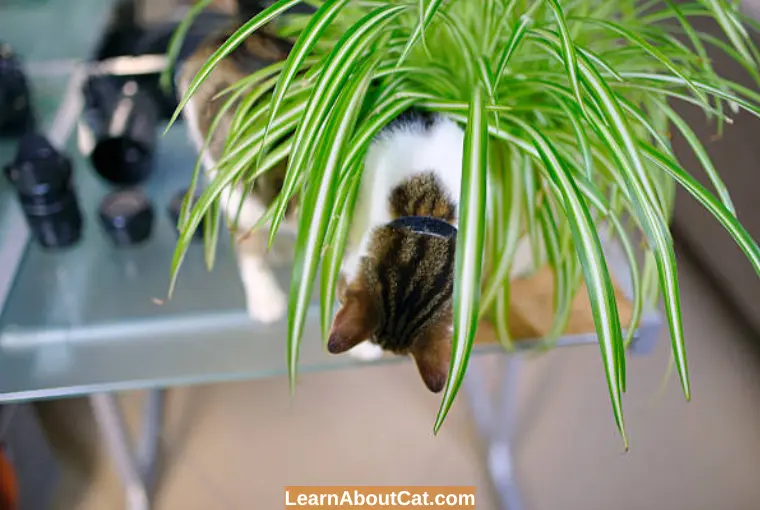
If your cat looks a little more agitated or has an upset stomach, there is nothing to worry about because they are not dangerous.
Knowing that your cat has taken some spider plant may give you peace of mind that their illness or behavioral abnormalities are not being brought on by something more serious. The followings are the warning indicators and symptoms to be on the lookout for:
- More diarrhea or watery feces in their litter box
- Vomiting may happen if too much of the plant has been ingested.
- Immediate nervous and anxious behavior after taking it
- Stomach discomfort might cause lethargy or loss of appetite.
- Bite marks on the leaves of a spider plant.
Warning Signs of Cat Poisoning
If you want to ensure that your cat recovers from the incident and receives the proper medical attention, you must be aware of the signs of cat poisoning.
Varied plants have different physiological effects and health risks, yet they all display the same symptoms. The following are the cautionary signs:
- Drooling or excessive salivation if the mouth or throat is affected
- Vomiting, nausea, and diarrhea if the digestive tract is damaged
- Breathing difficulties if the airways enlarge
- If the throat expands, you may lose weight or have difficulty swallowing.
- Increased thirst and increased urination are signs of renal damage.
It’s crucial that you are aware of these signs even if you don’t keep any dangerous plants at home. Outdoor cats are likely to devour whatever plants they come upon when scavenging.
Additionally, it is essential to examine each plant’s level of toxicity before buying because the plants I just named are not an exhaustive list. It’s possible that you are blissfully unaware that one of your houseplants is poisonous.
How to Respond if Your Cat Eats a Poisonous House Plant?
If you believe your cat has taken a dangerous or lethal herb, you must act quickly to prevent problems. You ought to take the following steps:
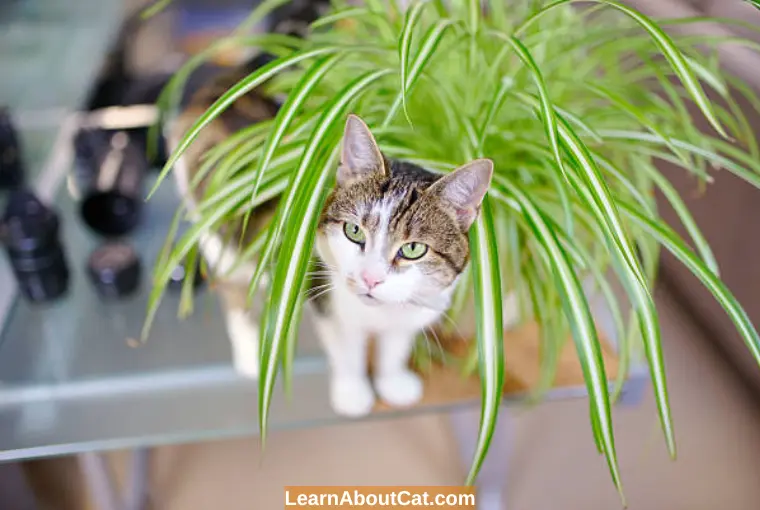
- If you catch your cat eating the dangerous plant, prevent them from doing so further. Make sure they can’t access it once again as well. Depending on its size, you might be able to pick up the plant and move it outside the space. On the other hand, keeping your cat out of the room where the harmful plant is situated will be easier if the plants are bigger and heavier.
- Call your veterinarian for quick, professional advice: After your cat eats a deadly plant, even if she seems to be doing okay, you should still call your veterinarian soon away to receive advice. They could suggest you call them for guidance, tell you not to worry until your cat starts displaying particular symptoms, or suggest bringing your cat in for a checkup.
- Take note of the signs that your cat exhibits. Also, keep in mind the moment you first see them. By doing this, your veterinarian will find it simpler to treat you if necessary. The diagnosis and effective treatment of your cat’s sickness or diarrhea can be aided by saving a little sample to give your veterinarian, even though doing so is a little distasteful.
Is There Anything I Can Do To Stop My Cat From Using A Spider Plant As A Litter Box?
Even though most people are more furious when cats consume their houseplants, some cats make life even more difficult by using indoor plants as litter boxes.
In this section, we’ll go over various actions you may do to stop your cat from using your houseplants as a litter box.
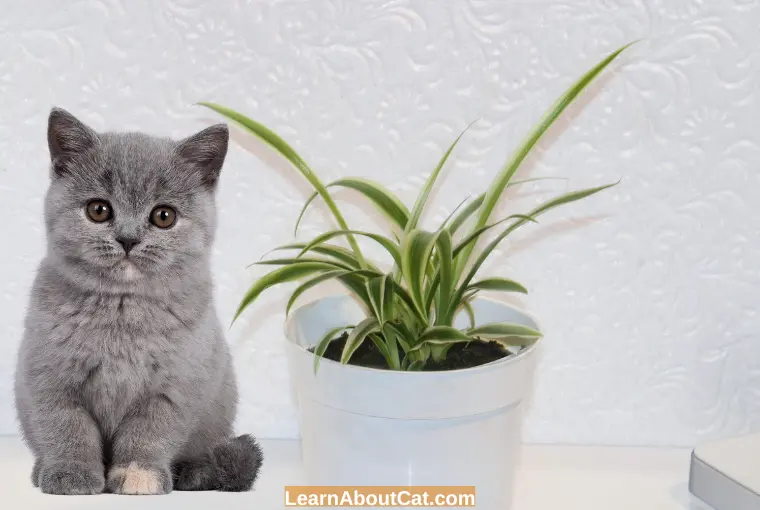
- Make sure the litter box is clean and free of debris. Being tidy creatures, cats may search for a different litter box if the one they are currently using is too filthy. This implies that you ought to, at the absolute least, regularly clean your litter box.
- If you have several cats, each one should have its own litter box.
- In case one cat develops territorial behavior, it’s also a good idea to space out the litter boxes across the home.
- Consider switching out the litter box as well. If the litter irritates their paws, cats relieve themselves elsewhere, such as in your houseplants. For example, standing on pellets could be painful, and breathing in dusty brands might hurt their eyes or lungs.
- If your cat has been declawed, it may be more sensitive to the type of litter you use and seek relief elsewhere.
Alternative Cat-Friendly Houseplants
Utilizing indoor plants that are friendly to cats is one of the best ways to prevent cat poisoning. It’s nice to hear that cats can survive with Chlorophytum comosum and are not harmful to spider plants. However, it’s not your only option!
These additional lovely indoor plants are safe for cats and a great option for pet owners.
Moth Orchids
Most orchids, including these, produce fresh blooms virtually all year round. Although they are not harmful to cats when eaten, overindulging might cause nausea and stomach discomfort.
Baby Rubber Plants
The Peperomia Obtusifolia, often known as the Baby Rubber Plant, is a superb alternative to the spider plant. It is safe for cats and easy to maintain, making it a fantastic choice for inexperienced gardeners or plant-busy parents.
Parlour Palms
You may keep the Parlour Palm in your home without worrying, even if not all palm plant types are healthy for cats. This is one of the most well-liked indoor plants in the world and is suitable for cats, so pet owners should choose it.
Ferns of Bermuda
ferns are they harmful to cats? Depending on the variety, they could be. This includes ferns like the Asparagus Fern and the Fern Palm. On the other hand, the Boston Fern is an exception and a beautiful addition to any home that allows cats. Other safe and non-toxic fern species are the Bird’s Nest Fern and the Stag Horn Fern.
Prayer plant
The Maranta leuconeura, often known as the Prayer Plant, is a suitable substitute for anybody who has pets. Since they never become too big, these lovely houseplants are ideal for keeping on your desk or a small shelf at home. Additionally, this plant won’t make your curious cat ill.
Check Out: Are Ferns Toxic to Cats?
Which Plants are Toxic to Cats?
I’ll now discuss a number of common plants that are poisonous to cats. It’s essential to know which to avoid.
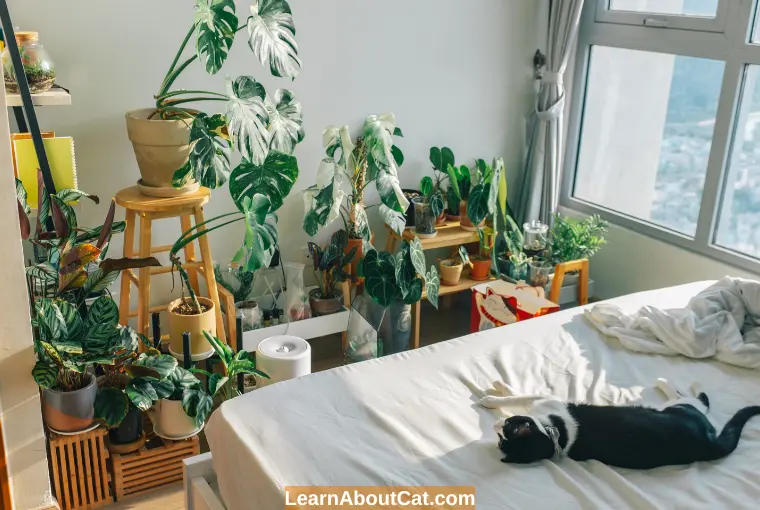
Lilies
Various lily species, including Asian, Japanese Show, Casa Blanca, Tiger, and Stargazer, have been shown to cause renal failure in cats.
The mouth can get irritated by azalea and rhododendron leaves, which can also cause vomiting and diarrhea, low blood pressure, a coma, and even death.
Oleanders
Oleanders: The oleander has a poison that can cause lethal hypothermia, gastrointestinal infections, erratic heartbeats, and abnormal cardiac rhythms.
Cyclamen
Cyclamen: These plants have the potential to lead to acute vomiting and major gastrointestinal issues.
Aloe Vera
Cats who consume aloe vera may vomit, shake, have digestive issues, develop anorexia, and experience depression.
Tulips
Tulips contain toxins that can cause digestive problems, appetite loss, and irregular heartbeats.
Frequently Asked Questions
Can cats die from eating spider plants?
It is rare for a cat to die from eating spider plants. However, it can cause severe digestive issues, leading to dehydration and other health problems.
Can cats get addicted to spider plants?
While cats may enjoy playing with and chewing on spider plants, there is no evidence to suggest that they can become addicted to them. However, if your cat is constantly chewing on your spider plant and exhibiting obsessive behavior, it’s a good idea to discourage this behavior and provide them with alternative forms of stimulation.
It is important to monitor your cat’s behavior around plants to ensure they are not ingesting too much, which can lead to digestive issues.
Do spider plants make cats throw up?
Spider plants are not toxic to cats but can cause digestive upset if ingested in large quantities. This can lead to vomiting, diarrhea, and other gastrointestinal symptoms. If you suspect your cat has eaten a spider plant and is experiencing these symptoms, contact your veterinarian for advice.
My cat ate my spider plant. Will it grow back?
Yes, If your cat has eaten part of your spider plant, it may take some time for the plant to recover. However, spider plants are hardy and can usually grow back from damage caused by chewing or other forms of damage. Keep your plant well-watered and fertilized to help it recover more quickly.
Can I still keep spider plants in my home if I have cats?
Yes, you can still keep spider plants in your home if you have cats. Just keep them out of reach, or use cat deterrents to keep your feline friend from getting too close.
Wrap UP!
Spider plants are safe for cats. They are a great substitute for cat owners because they don’t include harmful ingredients and won’t harm your cat.
Do spider plants provide a threat to cats? Possibly not always, though! They are not poisonous, but if your cat eats a lot of them, they could make them feel a little nauseated, and the long leaves can be dangerous if they fall.
You should make all necessary efforts to keep spider plants out of your cat’s reach because cats seem to be drawn to them. While spider plants are safe, other plants can harm cats, so it’s important to be aware of them and keep them out of reach.
Related Posts:
Who is Isabella?
My name is Isabella, and I am a dedicated and knowledgeable cat enthusiast. With years of experience caring for cats and a deep love for felines, I made a mission to help other cat lovers navigate the challenges of cat ownership.


